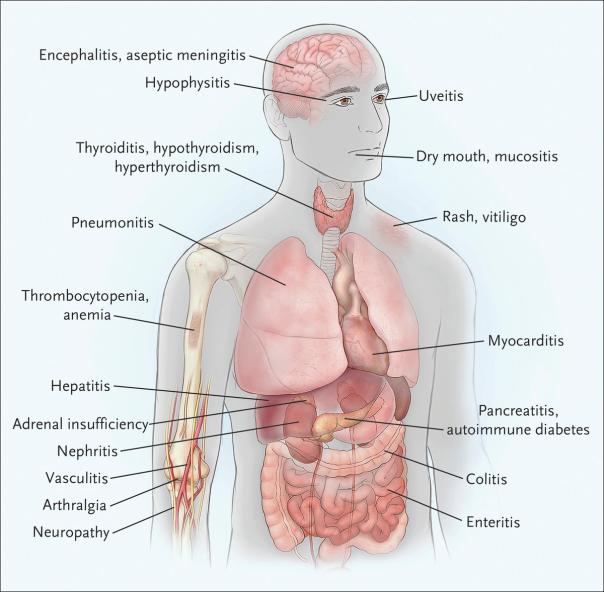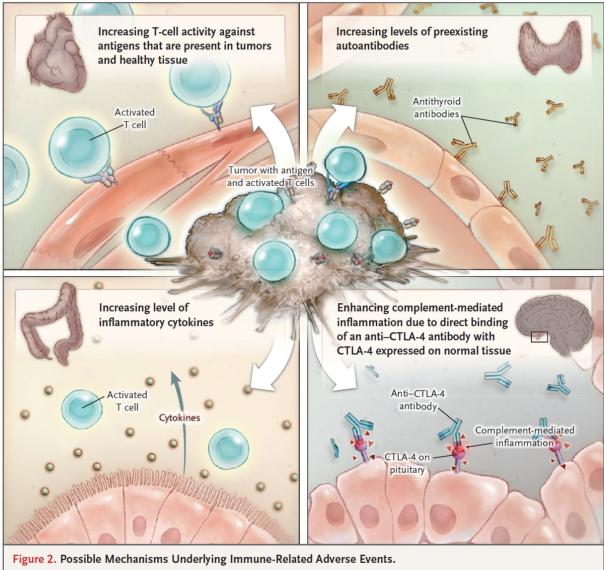Immune-related adverse events suppressed by immune checkpoints
Immune-related adverse events suppressed by immune checkpoints
January 22, 2018 Source: Sina Pharmaceutical
Window._bd_share_config={ "common":{ "bdSnsKey":{ },"bdText":"","bdMini":"2","bdMiniList":false,"bdPic":"","bdStyle":" 0","bdSize":"16"},"share":{ }};with(document)0[(getElementsByTagName('head')[0]||body).appendChild(createElement('script')) .src='http://bdimg.share.baidu.com/static/api/js/share.js?v=89860593.js?cdnversion='+~(-new Date()/36e5)];The human immune system is our own powerful weapon. If properly managed, it can defend against deadly intruders. For decades, this idea has attracted the attention of researchers: Can we use the immune system to generate an immune response to our target disease (such as cancer)? Since cancer is derived from human cells, it is usually evaded by the human immune system. And even if the immune system recognizes the presence of cancer and attempts to attack these cells, it usually causes human healthy cells to be attacked, causing inflammation or other side effects.
A review article published in the January 11th, 2018 issue of the New England Journal of Medicine, which analyzed the occurrence of immune-related adverse events caused by immunological checkpoint inhibitors. Dr. Michael Postow, an oncologist at the Sloan Kettering Cancer Memorial Center and the lead author of the article, said: "The success of these side effects will depend on multidisciplinary collaboration. As an oncologist for treating cancer patients, We need to learn from experts who treat autoimmune diseases. Some side effects of immunotherapy are similar to the symptoms of autoimmune diseases.†He added: “Experts treating Crohn's disease may help oncologists treat cancer patients. colitis."
Immunological checkpoint inhibitors act by reducing inhibition of the immune system. CTLA4 and PD-1, a checkpoint protein, prevent destructive cells from attacking the body's own tissues. By blocking their pathways, the researchers effectively released immunosuppression, allowing T cells to activate to discover and destroy cancer cells. Although cancer cells look like human primary cells, they contain a large number of mutations, some of which produce new antigens, a new protein that causes the immune system to recognize.
However, sometimes T cells overly attack non-cancerous cells, thereby producing side effects similar to the symptoms of autoimmune diseases. These symptoms mainly affect the skin, intestines, endocrine glands and liver, causing inflammation or other symptoms. As many as 40% of patients treated with checkpoint inhibitors are affected by autoimmune reactions, the most common being vitiligo, colitis, hepatitis and rash. Severe and potentially life-threatening conditions, including inflammation of the lungs or heart, are rare. Postow said: "The side effects are more common, but the fatal reaction is not much."

Figure 1 Organs that may be affected by immune-related adverse events

Figure 2 Possible mechanisms of immune-related adverse events
Dr. David Fisher, director of the Melanoma Program at the Massachusetts General Hospital Cancer Center, said: "Depending on the type of disease, it is difficult to make immunological treatment without considering these side effects. If the patient has metastatic stage IV melanin Tumors, in addition to immunotherapy, in fact, no treatment is available to achieve long-term stable relief of the disease, these patients often choose to use immunotherapy. For other situations, immunotherapy provides a 'statistical therapy' to prevent tumor resection Possible recurrence afterwards."
In fact, some patients will definitely have cancer recurrence, and the recurrence will be metastatic and fatal. Inhibition of the immune checkpoint seems to prevent about half of the recurrence. But at the moment, it is impossible to determine which patients will relapse? This raises the question of why they should be exposed to toxic risks if they never recur.
Fisher explained: "Intensive research on mild side effects may lead to new discoveries. For example, vitiligo is caused by white plaques on the skin when the immune system destroys normal melanocytes. Treatment with immunological checkpoint inhibitors Similar white plaques may also appear in patients with melanoma, suggesting that T cells do not only respond to new antigens on melanoma cells, but some T cells also respond to related antigens in normal tissues. Understanding why this happens can help us expand the use of immunological checkpoint inhibitors, such as the current best for patients with evidence of inflammation before the start of treatment."
Dr. Postow said: "The mechanism behind immune-related adverse events is unclear. Some studies have shown that side effects are associated with better anti-tumor effects. But others have found that patients with and without these side effects have The treatment outcomes are similar. Different patients have different disease remissions, and many patients' immunotherapy changes the physical condition in a completely different way, which affects the duration of side effects and the rate at which the tumor disappears."
Up to one-third of patients taking immunological checkpoint inhibitors use immunosuppressive agents to treat their side effects. Surprisingly, this does not seem to interfere with the anti-tumor effect of immunological checkpoint inhibitors. Some studies have even shown that patients treated with immunological checkpoint inhibitors combined with immunosuppressive agents have similar treatment outcomes to those who do not.
Postow said: "Fortunately, although the side effects will last for a while after stopping treatment, it will not cause a new permanent chronic autoimmune disease. For most people, the side effects will be temporary. The inflammatory response disappears. However, in some cases, patients may develop long-term endocrine diseases, especially thyroid dysfunction. Although this side effect can be controlled, it is not considered to stop using checkpoint inhibitors. Reasons, but for oncologists, it is important to carefully observe the possible endocrine effects, as they significantly affect the quality of life of patients and the tolerance of immunotherapy."
In general, immunological checkpoint inhibitor therapy is safer than chemotherapy, and as more patients begin to receive treatment, oncologists working with autoimmune research will have a clearer understanding of these symptoms. treatment. Postow said: "These autoimmune diseases must not be treated many times. But the fact is that in recent years, the role of the immune system in cancer treatment has caused so much concern, in fact, it can be used for the treatment of patients with autoimmune diseases. Help." (Sina Pharmaceutical Compilation / David)
Reference source: The Challenge of Immunotherapy: Staying on Target
Original title: New troubles for progress? Immune-related adverse events suppressed by immune checkpoints
Black sesame oil
1)All natural
2)Quality guaranteed since 2000.
3)Made from 100% premium roasted Chinese sesame seeds.
4)Traditional stone grinding process
5)No artificial colouring and no flavour.
6)Cholesterol free.
Black Sesame Oil,Pure Black Sesame Seed Oil,100% Purity Sesame Oil,Super Grade Black Sesame Seeds Oil
Chinese Seasoning (Shandong) Trading Co.,Ltd , https://www.zt-trading.com